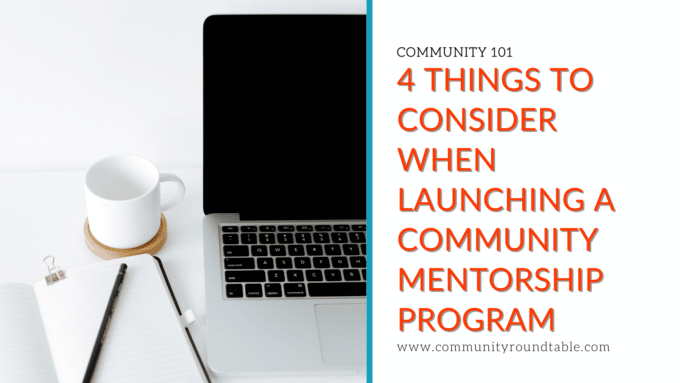Mentorships have existed, well, forever, and they’ve always been an excellent way to share knowledge. But with the COVID-19 pandemic, loads of mentorship programs have had to shift from in-person to virtual, and that’s not always an easy feat. Not easy, but not impossible — especially with these four tips to help bring mentorship programs to your Community!

Survey says: gauge interest
Much like with any new idea, what sounds good on paper could flop on execution. To avoid disaster it’s best to determine if a mentorship program could be valuable to your Community.
No need to reinvent the wheel to do so. Simply share a poll to the relevant channel in your Community asking if mentorship programs are of interest. Be sure to set clear expectations around when the poll closes, so your data is as robust as possible.
Not getting enough organic engagement to tell? No worries!
Aside from pinning the poll to the top of the channel, you could also send out email communications (or social posts if relevant for your Community) inviting Members to participate. Essentially any way to get a true idea of feelings around the program, and possible number of participants, is a must-have to avoid a problem commonly found in mentorship programs: an abundance of mentees and not enough mentors to go around. Remember, you need to have both components for a mentorship program to work!
Once you’ve determined the program has enough interest to move forward, it’s time to start the matching process.
A match made in [mentorship] heaven
Much like with any relationship, you want to ensure both mentor and mentee feel a spark, a connection … anything so as to avoid a bad match! So while it may be tempting as program manager to just start assigning mentors to mentees and calling it good, doing that will only set you up for failure.
Instead, mindfully create your mentorship program application process. Ask robust enough questions to ensure the right fit. When possible, partner people with others who have similar interests, career paths, goals, etc.
Some other things to consider when building out your program:
- Length of the mentor-mentee relationship. Not everyone has the same amount of time available to dedicate to a mentorship (or as in-depth of a need). As a result, consider offering some shorter-term mentorship programs so more people can be involved. Timeframes to consider: 3-6 months; 6-9 months; 9 months-1 year.
- Provide a partnership policy. By clearly setting all expectations around the mentor-mentee relationship (frequency of meetings, preferred communication methods, end date, etc.), both parties will be able to determine if they’ve been successful.
- Work toward a common goal. Have the individual mentor-mentee teams determine a goal to accomplish during the relationship. Once it’s been met, the pair can then reassess to determine if the relationship needs to continue beyond or not.
By having a thorough application process, you’ll be able to ensure more productive mentoring relationships. Bonus: You can avoid any recurring nightmares around randomly assigned group projects from college. No dead weight allowed in a mentorship program!
Work with what [the platform] gave you
Interest? Check.
Mentors and mentees? Check.
Staying on top of things as the Community Manager? We’ve got you.
A lot of community platforms now come with mentorship modules built in. Use them! Especially if they can help automate a lot of the program management aspects (sharing resources with newbies, reminding mentors to schedule kick-off calls, etc.). Because the reality of it is, mentorship programs should only take up a small portion of your time each week. Automation helps ensure that’s the case.
If automation isn’t your jam, don’t fret. You could also set up recurring calendar reminders to reach out periodically based on the duration of the program length. Don’t overthink it!
Count what matters
If your mentorship program is net new, you’ll want to ensure you adjust expectations around ROI. Yes, sadly, it can be difficult to tie dollar amounts to what mentorship programs can accomplish. Instead, it’s better to help leadership see and understand the metrics that actually count in this instance, like:
- Active number of participants (both mentors and mentees)
- Active relationships currently running through the program
- Increased number of visitors to the platform
- Total number of new Members
If your leadership still isn’t convinced, consider using testimonials from program participants. After all, there’s no better way to show value than to let those who are using the mentorship program explain exactly how it’s benefitted them since joining.
